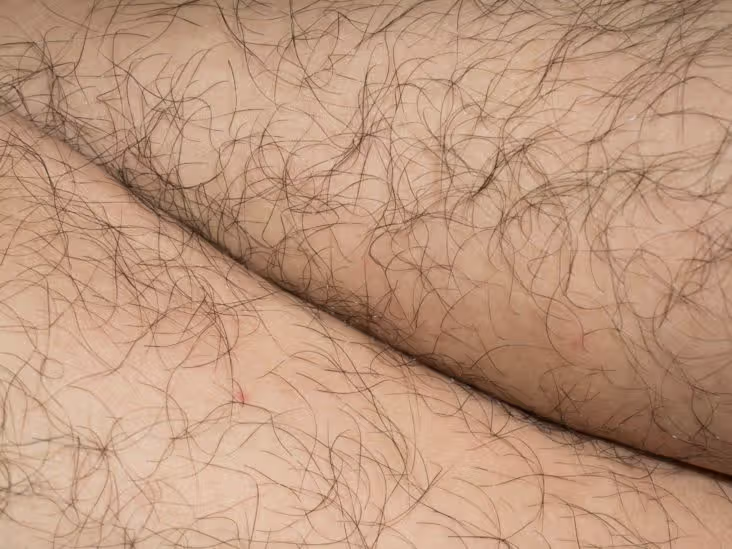Lifestyle
7 Ways To Deal With Hairs On These Parts

From heritage to hormones, there are many reasons for hair on ladies’ chin. It may not be something to worry much about as the following article shows,
It’s a common experience: Discovering a hair — or several — where you aren’t expecting it. Sometimes, the discovery is a cause for celebration or laughter. Other times, you may find yourself greeting the new hair with dismay, straight-up confusion … or a pair of tweezers.
Some women find the presence of hair on their chin or jawline particularly upsetting. Despite being a normal result of the many hormonal changes we experience over the course of our lives, many cultures associate facial hair with masculinity.
What some view as a simple stray whisker can be devastating to others’ self-identities and self-concepts — and occupy big chunks of their daily lives. A 2006 study found that women living with unwanted facial hair reported high levels of anxiety and depression and spent, on average, 104 minutes on facial hair removal and maintenance every week.
To further complicate a discussion of facial hair in women, facial hair is not a uniform characteristic. Some people are naturally hairier than others. That means one person’s “normal” hair growth and pattern may be a symptom of a health issue in another.
It’s a lot to wrap your head around. That’s why we talked to endocrinologist Vinni Makin, MD, about the many causes of hair on your chinny chin chin — and different options for removing unwanted facial fuzz.
What Causes Hair On Ladies’ Chin
In order to tackle this hairy subject, a few definitions are in order:
Vellus hairs: The fine hairs that we commonly refer to as “peach fuzz.” We all have vellus hair on our faces (and bodies), though the quantity and location differ from person to person.
READ ALSO: How To Improve Pregnancy Care For Sickle Cell Patients -WHO
READ ALSO: Genital Herpes: Who Raises Alarm Over Infection Rate
Terminal hair: The thicker, longer, darker and more deeply rooted hair that makes up your eyelashes, eyebrows and head hair.
Hormone changes like those we all experience during puberty can turn vellus hair into terminal hair. When we go through puberty, we’re producing more hormones — specifically, our body begins producing more androgens (also known as sex hormones).
Regardless of our biological sex, we all see some of our vellus hair turn into terminal hair in what are called androgen-dependent areas of the body — places like your underarms and around your genitals. As androgen levels go up, so, too, does the amount of face and body hair you develop. You also become capable of growing hair in more places, including your knuckles, back, stomach, buttocks and chest — areas typically associated with men.
When your hormone levels fluctuate, the amount and type of hair on your body can change. For women, those hormone fluctuations occur throughout your life, including during puberty, pregnancy and menopause. This is totally not only normal, but it’s a good thing.
So, you may find a new hairs on your chin that you never had before. You may also find that the amount of new hair you have goes well beyond one or two new strands. If you’re experiencing new, thick, coarse hair anywhere on your face or body, this typically falls into one of two categories:
Hirsutism describes reproductive-age women developing excessive hair growth due to a hormonal imbalance — specifically, the overproduction of androgens. But it is possible to be diagnosed with idiopathic hirsutism. It’s a fancy way of saying you don’t have the other symptoms of a hormone imbalance, so we don’t know what’s causing it.
Hypertrichosis is excessive hair growth that decidedly isn’t attributable to a hormone imbalance and could be due to other health conditions or side effects of a medication.
Whether it’s a few new hairs or decidedly more than just a few, there are several different reasons this could be happening. We’ve collated some of the most common causes of facial hair in women below:
Aging Could Account For Hair On Ladies’ Chin
For women, hair growth on the chin and jawline can be a part of getting older. The hormonal changes that come with menopause impact both your head and body hair. While it may be unpleasant, it’s not unusual to feel the texture of your head hair change — and even notice hair loss — at the same time your upper lip and jawline start to get fuzzy. If these changes are happening very quickly, they might be cause for concern and medical evaluation.
Hormone imbalance
A large proportion of the people who come to Dr. Makin with complaints about chin hair do so as part of a larger — and seemingly opposite — concern caused by a hormone imbalance: scalp hair loss. That’s because when your body is producing too many androgens like testosterone, it will cause hair loss on your head and growth on your face.
READ ALSO: Why High Fertility Rate Has Become a Big Problem In Nigeria
READ ALSO: ‘We Struggled To Have Kids For Over 4-Years, Everyone Laughed At Us’
Polycystic ovary syndrome (PCOS) & Hairs On Ladies’ Chin
Polycystic ovary syndrome is one of the conditions that may run in families. What we know for sure is that it’s a very common endocrine condition: Somewhere between 5% and 15% of women of reproductive age have https://en.wikipedia.org/wiki/Type_2_diabetesthe condition, which causes a wide range of complications from irregular periods and acne to a significantly elevated risk of Type 2 diabetes.
PCOS disrupts your endocrine system, causing an overproduction of androgens. That hormone imbalance can cause hair growth in androgen-dependent areas of the body and scalp hair loss. It’s one of the most common causes of hirsutism, with severe cases sometimes causing women to develop full beards.
Heritage
Sometimes, the reason you’ve got a bit more hair on your face than other people comes down to your family tree. For some people, they’re inheriting physiological traits associated with a geographic location or ethnic group. For example, hirsutism is most common in people of Southeast Asian, Mediterranean and Middle Eastern descent — and less common, Dr. Makin says, in Native American and East Asian women.
Diabetes & Hair On Ladies’ Chin
While we don’t know exactly why, there’s a clear correlation between insulin resistance and hyperandrogenism, even in people who don’t have PCOS. It’s not unusual, then, for women with diabetes to notice an increase in body and facial hair at the same time that the hair on their head is thinning.
Cushing syndrome
Excessive hair growth — on both your face and other areas of your body — is a common symptom of a rare condition called Cushing syndrome. People with Cushing have too much cortisol in their body, either because their body produces too much of the hormone or as a side effect of a medication.
Late-onset congenital adrenal hyperplasia
“Congenital adrenal hyperplasia” is an umbrella term that describes a range of different adrenal gland disorders. Some are born with these conditions, while others experience them later in life.
Significant weight gain or loss
When we lose or gain a significant amount of weight in a short period of time, it messes with our hormones. The resulting imbalance often results in an increase in facial hair. In fact, some people with eating disorders like anorexia nervosa and bulimia nervosa develop lanugo, the fine hair that covers fetuses in the uterus.
Medications
There are a number of medications that count hair growth as a side effect, including anabolic steroids, as well as certain kinds of chemotherapy and epilepsy treatments.
Hairs On Ladies’ Chin: Removal Options
Chin or facial hair on women is not, in and of itself, a medical concern. What is a medical concern, Dr. Makin explains, are the feelings that extra hair sometimes brings with it.
“Everyone has a different level of comfort with it,” she continues. “For some, a few stray hairs can be emotionally distressing, while others might have much more hair growth and don’t feel bothered by it. It’s the individual’s level of comfort that’s important.”
-Culled from Quora
To be concluded

























